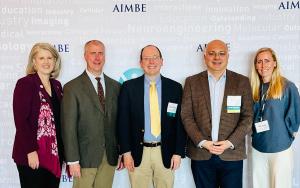Timothy E. Allen, Ph.D.

About
Timothy E. Allen teaches and mentors students in the areas of computational modeling of complex biological systems, molecular and cell biology assays, and medical device design. He is a Professor in the Department of Biomedical Engineering at the University of Virginia. He received a B.S.E. in Biomedical Engineering at Duke University and M.S. and Ph.D. degrees in Bioengineering at the University of California, San Diego.
Dr. Allen's teaching activities include coordinating the undergraduate teaching labs and the Capstone Design sequence in the BME department at the University of Virginia, and his research interests are in the fields of computational biology and bioinformatics. He is also interested in evaluating the pedagogical approaches optimal for teaching lab concepts and skills, computational modeling approaches, and professionalism within design classes. He is active within the Biomedical Engineering Division of the American Society for Engineering Education and previously served on the executive committee of this division (Program Chair 2011, Division Chair 2012, & Nominating Committee Chair 2013). Dr. Allen is a fellow in the American Institute for Medical and Biological Engineering (AIMBE) College of Fellows, and he has received twelve teaching awards and honors at UVA, including the All-University Teaching Award and the Thomas E. Hutchinson Faculty Award for Dedication and Excellence in Teaching. Since 2016, he has been the PI on an NSF REU site in multi-scale systems bioengineering and biomedical data sciences, a pan-university collaboration involving faculty from four schools at UVA, as well as six partner institutions in the mid-Atlantic and Southeast.
Education
B.S.E. Duke University, 1999
M.S. University of California, San Diego, 2001
M.S. University of California, San Diego, 2001
